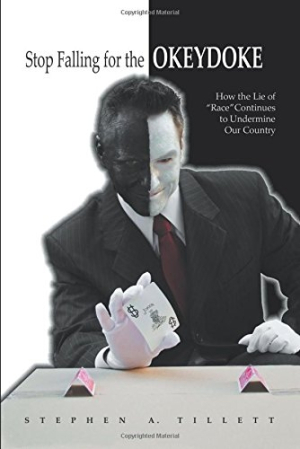Stop Falling for the Okeydoke
How the Lie of "Race" Continues to Undermine Our Country
The argument that race is an archaic and counterproductive social construction is cogent, smartly argued, and thought-provoking throughout.
Stephen A. Tillett’s Stop Falling for the Okeydoke suggests that race is a false concept that fosters attitudes and behaviors detrimental to society, especially a society as diverse as America. Though the subject sounds a bit stiff, supple writing and good pacing make for an interesting read.
Written in the first person, the book begins with a brief autobiography that traces influences on Tillett’s thinking, most notably the example set by his family, his education, and his experiences as an African American Methodist minister. He cites experiences with parishioners as well as personal anecdotes when making his points, all of which, combined with the book’s friendly tone, lift the book beyond what could have been a dry philosophical presentation.
The book moves swiftly to its central point—that the concept of “race” is a social invention without scientific support, and that the percentage of genetic variation between individuals in different races is no greater than among individuals of the same race. The book cites so many respected sources to back up this point that it would be difficult to argue against it, and one comes to wonder why—especially in today’s world—the concept of separate races persists at all.
The stubbornly held concept of race creates “us vs. them” divisions, Tillett says, and keeps each group isolated from others—a form of okeydoke, or “something that is absurd and ridiculous or something that is designed to swindle or deceive.”
The first half of the book is a detailed argument in support of abolishing the concept of race, giving examples of its corrosive effects and arguing that we collectively need to get past the iron wall of racialism.
This is the book’s freshest, strongest, and most interesting section. The writing is intelligent without being pedantic, and the variety of people quoted—from Jesus to the Founding Fathers to Einstein—demonstrates how much alike we really are. Key ideas are often introduced with real-life anecdotes or examples from well-known films, a technique that keeps the book lively and makes abstract ideas easy to grasp.
The second half returns to left-leaning politics, drawing key inspiration from Howard Zinn, author of A People’s History of the United States. Zinn’s book is cited more than two dozen times.
The final chapter implies that, now that fresh facts and new political remedies have been presented, there’s no need for further debate, only action. This does not live up to the inclusiveness called for earlier, and dissenters, who have no doubt heard and argued the not-so-new and not-so-settled politics before, will not be won over by the implication that any disagreement can be attributed to personal greed and willful ignorance.
The book’s core thesis—that race is an archaic and counterproductive concept that’s holding us back as individuals and as a nation—is cogent, smartly argued, and thought-provoking throughout.
Reviewed by
Susan Waggoner
Disclosure: This article is not an endorsement, but a review. The publisher of this book provided free copies of the book and paid a small fee to have their book reviewed by a professional reviewer. Foreword Reviews and Clarion Reviews make no guarantee that the publisher will receive a positive review. Foreword Magazine, Inc. is disclosing this in accordance with the Federal Trade Commission’s 16 CFR, Part 255.

